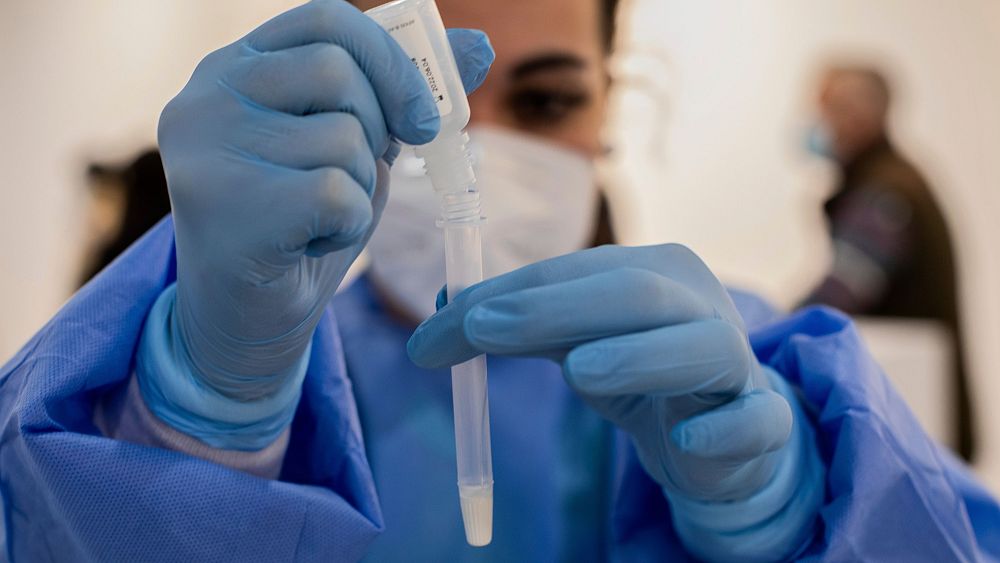As countries battle the second wave of coronavirus in Europe, some are rolling out novel testing regimes to try to get a grip on the pandemic that has led to a second round of lockdowns and strict measures across the continent.
One of those was Slovakia, which tested two thirds of its population this weekend.
One of the features of coronavirus that makes it so hard to track is that people can be asymptomatic spreaders, or can spread it before the onset of symptoms, meaning without testing it can be impossible to know if somebody could be passing it on.
From the ambitious idea of testing an entire nation, to buying millions of faster but less accurate tests, here’s what some countries are doing.
Slovakia tests the entire nation
Slovakia has started its ambitious project to test every adult in the country.
The testing is voluntary, and free, and began in earnest on Saturday with some 5,000 testing centres opened across the country. Those who didn’t take part were required to quarantine, while those that gave a negative result were then free from extra restrictions.
This weekend, the government announced tests were carried out on 3.6 million people, out of a country with a population of 5.5 million.
Only 1% of those tested gave a positive result – although the tests are antigen tests, so less accurate than PCR.
“We have taken a great step forward,” Prime Minister Igor Matovic. “But we must not think that with this 1%, everything is already going well. This is not the case,” he added to the press.
“In reality, up to 2% of our inhabitants may be infected. This is not a good situation at all,” the head of government said.
A second round of tests is planned for the next weekend but isn’t yet confirmed.
Slovakia has seen a sharp increase in coronavirus cases, although the rate is below the EU average.
The country recorded 1,883 new infections on Monday, bringing the total to 61,829 cases. The death toll currently stands at 219.
The programme has been criticised for being poorly organised.
According to the Slovak Association of General Practitioners, the high concentration of people at screening sites remains “in contradiction with the recommendations of infectious disease experts”.
Germany bulk buys antigen test
Less accurate than the standard PCR test, antigen tests are cheaper and deliver a result much more quickly.
Germany is now bulk buying millions of the tests each month, as part of what Chancellor Angela Merkel called a “new strategy” to allow care homes to continue to take visitors.
How to protect care homes while allowing visitors to see their loved ones has been a big challenge since the global outbreak in the spring.
Germany’s plan is to give care homes up to 20 free monthly antigen tests per resident, which can be used for patients, staff, and visiting relatives.
This way, those that want to visit can quickly be tested to see if they have COVID-19. While the antigen test is less accurate than the PCR test, scientists say it is able to detect if somebody is infectious.
“We can now basically perform rapid tests on visitors to nursing and care homes,” said Merkel.
“Health insurers will cover the costs for a certain number of visitors each month. That’s huge progress in terms of protection.”
Germany has one of the world’s oldest populations, with more than 24 million people over the age of 60, and around 900,000 living in care homes.
A health ministry spokeswoman told The Associated Press that manufacturers have agreed to supply Germany with 9 million antigen tests in November and 11.5 million tests in December.
Still, experts caution that the limitations need to be taken into account. A Swiss study recently found that with two widely available antigen tests, between 85 and 89 out of 100 people with coronavirus tested positive.
“It does fulfil the criteria that are published by the (World Health Organization), which should be more than 80% sensitivity,” said Isabella Eckerle, who heads the centre for emerging viral diseases at the University of Geneva, where the tests were validated.
While the tests are less accurate, they provide quick results, she noted.
“One big advantage of these tests would be that you, for example, can build up a decentralised testing centre,” she said.
“So you build up a tent, let’s say, in front of a school or in a park, and then people can come. And then after 15 minutes, they will know if they are positive or not.”
UK to test the whole city of Liverpool
Another mass testing programme being rolled out, the British government plans to provide regular testing for the entire city of Liverpool.
The northern city of 500,000 people has one of the highest infection rates in England, with more than 410 cases per 100,000 people.
The trial is seen as a test of how the UK could roll out mass testing across the country. The trial is beginning this week.
England is set to begin a second national lockdown on Thursday, with varying restrictions across Wales, Scotland and Northern Ireland.








